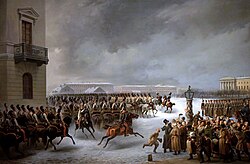| Years in Russia |
|---|
| Centuries |
| Decades |
| Years |

Events from the year 1825 in Russia
| Years in Russia |
|---|
| Centuries |
| Decades |
| Years |

Events from the year 1825 in Russia
| | This section needs expansion. You can help by adding to it. (October 2015) |
| | This section needs expansion. You can help by adding to it. (October 2015) |
пятерых повесили, Пушкин лично каждого знал, в том числе и Рылеев, к которому Пушкин собирался накануне восстания
![]() Media related to 1825 in Russia at Wikimedia Commons
Media related to 1825 in Russia at Wikimedia Commons